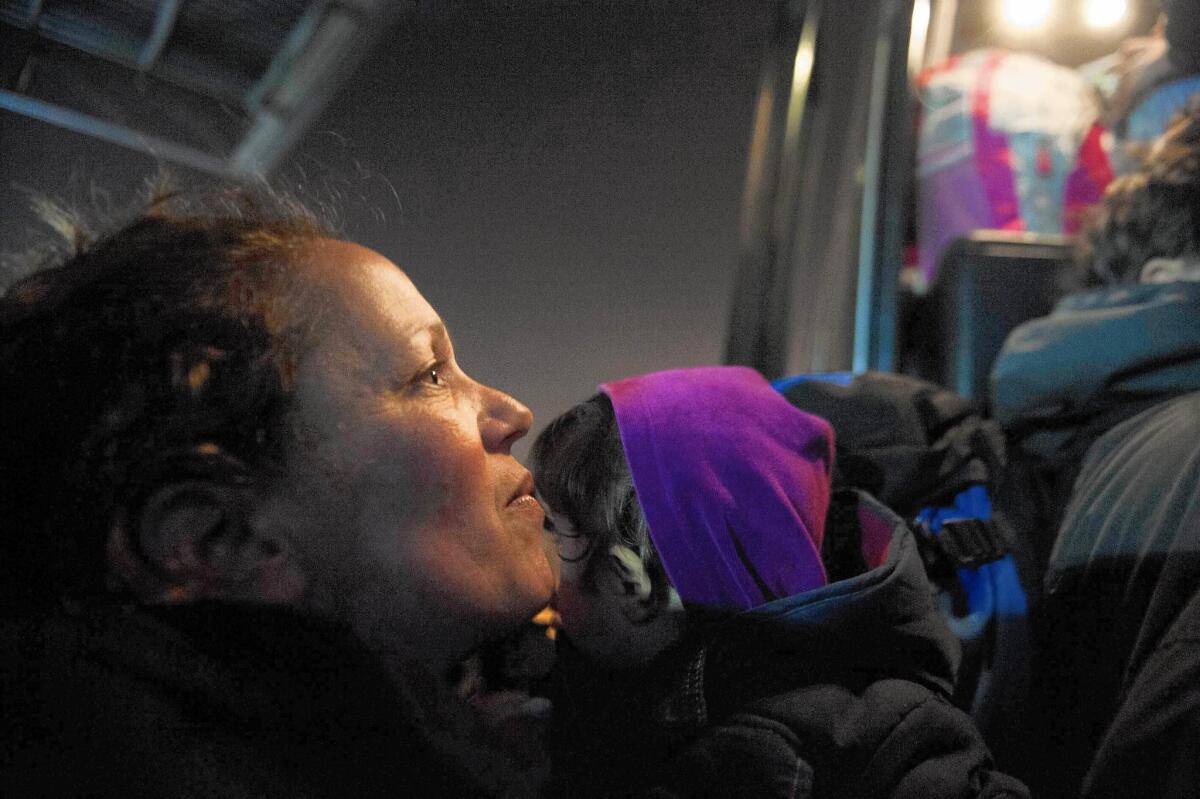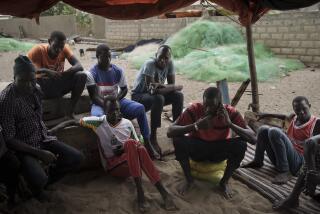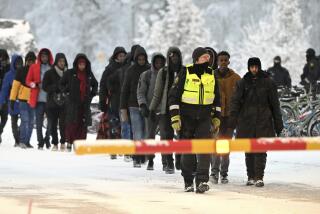Thousands flee economic despair in Kosovo for EU countries, welcome or not

Sixteen years after the war in Kosovo sent hundreds of thousands of refugees streaming across the border, another exodus is underway here.
Instead of fleeing conflict, Kosovars are now seeking to escape unemployment, and despair. They are leaving by the tens of thousands, making their way illegally into European Union countries to look for a better future.
Just a trickle until September, the number of migrants suddenly surged last fall, spurred by word of mouth. At least 26,000 Kosovars migrated to EU member states in 2014, and more than 18,000 more have already made the trip since the beginning of this year.
That residents of Europe’s youngest nation are joining Syrian and Afghan refugees on smuggling paths to EU countries is a telling indictment of the international state-building effort in Kosovo. For many, the hope that blossomed when independence from Serbia was declared in 2008 has turned to bitterness as poverty and corruption stall the country’s progress.
The main bus station in the capital, Pristina, is routinely packed with hundreds of people pushing their way onto buses leaving Kosovo.
“For 15 years I’ve been working and paying taxes to support the state. In return, all we ask for is a better future for our kids. But we get nothing,” said a man at the terminal who would give only his nickname, Tony. “This country was broken before we began. A lot of corruption, a lot of warlords.”
Waiting for a bus on a frigid night with his wife and two small children, Tony said they were leaving because he couldn’t provide for them. His daughter, her blond curls in pigtails, tugged at his legs, and his son sipped from a juice box as his wife anxiously gathered their few belongings. Like others, they brought only what they could carry.
“It’s a terrible fate,” he said of the decision to depart. “It’s not a choice we make willingly. We have to do it for our children.”
The path to the EU region runs through Serbia, with which Kosovo fought a war in 1998-99 that led to NATO intervention. Allowed to enter Serbia with their national identification cards, Kosovars then board buses to Belgrade and on to Subotica, a town on Serbia’s border with EU member Hungary.
Most pay a smuggler to lead them across, an endeavor that can take hours on foot in freezing temperatures. Once in Hungary, they can travel through most EU countries, border-control-free, by bus, train or car to their final destination — often Germany, where thousands of Kosovars took refuge during the war.
Those arrested in Hungary usually claim asylum to avoid deportation. While waiting for their applications to be processed, most are not confined, and many disappear within days or weeks, headed for countries with stronger economies. Many again request asylum when they arrive at those destinations, unaware that the status is not granted to those fleeing economic hardship, no matter how severe.
Bekim Collaku, Kosovo’s minister of European integration, said about 26,000 Kosovars requested asylum in European Union countries last year.
Numbers from Hungary show that most left in the last quarter of the year. Before September, fewer than 1,000 Kosovars had claimed asylum in Hungary. But by December, the number had jumped to nearly 22,000 — about half of Hungary’s applications for the year.
In January and the first week of February, more than 18,000 Kosovars claimed asylum in Hungary, according to the country’s Office of Immigration and Nationality. In Germany, more than 3,000 Kosovars applied for asylum in January, double the number of initial applications from December and a 527% increase from January 2014, according to the Federal Office for Migration and Refugees.
The number of migrants is almost certainly higher than the number of asylum-seekers, as some pursue different ways — legal or not — to remain in EU territory.
More than 35% of Kosovo’s adults are unemployed, and the jobless rate among young people is 60%. Nearly 30% of the nation’s 1.8 million people live in poverty, according to the United Nations Development Program.
But the sudden surge of departures appears to have been motivated by word of mouth. Many would-be migrants say they decided to leave after watching neighbors and relatives depart and having read their Facebook posts about making it to an EU country.
While their probably futile asylum requests are pending, applicants are provided housing and sometimes a stipend for food, a small sum that might equal more than a month’s wages back home. That news filters back to Kosovo, without the caveat that most requests will eventually be denied, and the applicants repatriated.
Kosovar officials say speeding the application and repatriation process will help curb the flow of migrants. They are struggling to ease the exodus even as they face pressure from unrest: Large protests in January over comments by an ethnic Serb government minister ended in clashes with police. In recent days, President Atifete Jahjaga has visited communities hard hit by departures, urging residents to stay.
The government has good reason for trying to stem the flow. In an interview, Collaku said European Commission officials made clear in recent meetings in Brussels that the surge in illegal migration could harm Kosovo’s visa liberalization chances. Kosovo is the only country in the western Balkans whose citizens are excluded from visa-free travel through most EU countries, and reaching this agreement is a high priority for its leaders.
On Friday, about 20 German police officers joined Serb troops on the Serbian border with Hungary to help halt the flow of migrants.
Collaku said Kosovo’s government was working to boost the nation’s economy to give citizens incentives to stay.
“We need to make sure we bring hope and motivation for the people to stay here, and provide conditions for them to either start businesses or get new jobs,” he said.
“But this cannot happen overnight. It will take some time, and people need to be patient.”
He says the government is striving to make citizens aware of what they could lose if they spend what little they have to reach EU territory and then are sent back even poorer. Some have sold their homes or property or borrowed money to fund their travel, and if many are returned, an economic crisis could ensue. Advocates for Kosovo’s marginalized Roma, Egyptian and Ashkali minority communities, which face even dimmer prospects than the majority ethnic Albanians, say as much as a third of those populations have departed.
Despite the warnings, some Kosovars say they have little to lose. At Pristina’s bus station, a man who gave his name as Avni said he had tried to make a life for his family in Kosovo. “I work in construction. I’ve worked on more than 100 houses, and I still wasn’t able to build a house for myself,” he said.
Despite the risks, he and his wife, Myrveta, decided to take their 3-year-old son and head for Austria. Myrveta, seven months pregnant and wearing a thin coat, said she was worried about making the journey with a small child. But it was for the boy’s sake they were leaving, Avni said — to offer him a better future.
They planned to apply for asylum in Austria. “If we get sent back, we’ll return,” he said, shrugging. “But we have to try.”
Chick is a special correspondent.
More to Read
Start your day right
Sign up for Essential California for news, features and recommendations from the L.A. Times and beyond in your inbox six days a week.
You may occasionally receive promotional content from the Los Angeles Times.






